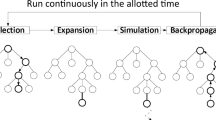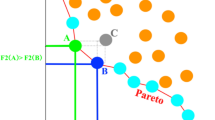Abstract
Runtime analysis aims at contributing to our understanding of evolutionary algorithms through mathematical analyses of their runtimes. In the context of discrete optimization problems, runtime analysis classically studies the time needed to find an optimal solution. However, both from a practical and from a theoretical viewpoint, more fine-grained performance measures are needed to gain a more detailed understanding of the main working principles and their resulting performance implications. Two complementary approaches have been suggested: fixed-budget analyses and fixed-target analyses. In this work, we conduct an in-depth study on the advantages and the limitations of fixed-target analyses. We show that, different from fixed-budget analyses, many classical methods from the runtime analysis of discrete evolutionary algorithms yield fixed-target results without greater effort. We use this to conduct a number of new fixed-target analyses. However, we also point out examples where an extension of existing runtime results to fixed-target results is highly non-trivial.


Similar content being viewed by others
References
Antipov, D., Buzdalov, M., Doerr, B.: First steps towards a runtime analysis when starting with a good solution. In: Parallel Problem Solving from Nature, PPSN 2020, pp. 560–573. Springer (2020)
Böttcher, S., Doerr, B., Neumann, F.: Optimal fixed and adaptive mutation rates for the LeadingOnes problem. In: Parallel Problem Solving from Nature, PPSN 2010, pp. 1–10. Springer (2010)
Buskulic, N., Doerr, C.: Maximizing drift is not optimal for solving OneMax. In: Proceedings of the Genetic and Evolutionary Computation Conference Companion, GECCO 2019, Prague, Czech Republic, July 13–17, 2019, pp. 425–426 (2019)
Buzdalov, M., Doerr, B., Doerr, C., Vinokurov, D.: Fixed-target runtime analysis. In: Proceedings of Genetic and Evolutionary Computation Conference, pp. 1295–1303. ACM (2020)
Carvalho Pinto, E., Doerr, C.: Towards a more practice-aware runtime analysis of evolutionary algorithms. arXiv:1812.00493 (2018)
Corus, D., Dang, D., Eremeev, A.V., Lehre, P.K.: Level-based analysis of genetic algorithms and other search processes. IEEE Trans. Evol. Comput. 22, 707–719 (2018)
Doerr, B.: Analyzing randomized search heuristics via stochastic domination. Theoret. Comput. Sci. 773, 115–137 (2019)
Doerr, B.: A tight runtime analysis for the cGA on jump functions: EDAs can cross fitness valleys at no extra cost. In: Genetic and Evolutionary Computation Conference, GECCO 2019, pp. 1488–1496. ACM (2019)
Doerr, B., Doerr, C.: The impact of random initialization on the runtime of randomized search heuristics. Algorithmica 75, 529–553 (2016)
Doerr, B., Doerr, C., Ebel, F.: From black-box complexity to designing new genetic algorithms. Theoret. Comput. Sci. 567, 87–104 (2015)
Doerr, B., Doerr, C., Yang, J.: \(k\)-bit mutation with self-adjusting \(k\) outperforms standard bit mutation. In: Parallel Problem Solving from Nature, PPSN 2016, pp. 824–834. Springer (2016)
Doerr, B., Doerr, C., Yang, J.: Optimal parameter choices via precise black-box analysis. In: Genetic and Evolutionary Computation Conference, GECCO 2016, pp. 1123–1130. ACM (2016)
Doerr, B., Doerr, C., Yang, J.: Optimal parameter choices via precise black-box analysis. Theoret. Comput. Sci. 801, 1–34 (2020)
Doerr, B., Fouz, M., Witt, C.: Sharp bounds by probability-generating functions and variable drift. In: Genetic and Evolutionary Computation Conference, GECCO 2011, pp. 2083–2090. ACM (2011)
Doerr, B., Goldberg, L.: Drift analysis with tail bounds. In: Parallel Problem Solving from Nature, PPSN 2010, Lecture Notes in Computer Science, vol. 6238, pp. 174–183. Springer (2010)
Doerr, B., Jansen, T., Witt, C., Zarges, C.: A method to derive fixed budget results from expected optimisation times. In: Genetic and Evolutionary Computation Conference, GECCO 2013, pp. 1581–1588. ACM (2013)
Doerr, B., Johannsen, D., Winzen, C.: Multiplicative drift analysis. Algorithmica 64, 673–697 (2012)
Doerr, B., Kötzing, T.: Multiplicative up-drift. In: Genetic and Evolutionary Computation Conference, GECCO 2019, pp. 1470–1478. ACM (2019)
Doerr, B., Kötzing, T.: Lower bounds from fitness levels made easy. In: Genetic and Evolutionary Computation Conference, GECCO 2021, pp. 1142–1150. ACM (2021)
Doerr, B., Le, H.P., Makhmara, R., Nguyen, T.D.: Fast genetic algorithms. In: Genetic and Evolutionary Computation Conference, GECCO 2017, pp. 777–784. ACM (2017)
Doerr, B., Neumann, F. (eds.): Theory of Evolutionary Computation—Recent Developments in Discrete Optimization. Springer, New York (2020)
Doerr, C., Lengler, J.: OneMax in black-box models with several restrictions. Algorithmica 78, 610–640 (2017)
Doerr, C., Wang, H., Ye, F., van Rijn, S., Bäck, T.: IOHprofiler: a benchmarking and profiling tool for iterative optimization heuristics. https://arxiv.org/abs/1810.05281 (2018). IOHprofiler is available at https://github.com/IOHprofiler
Doerr, C., Ye, F., van Rijn, S., Wang, H., Bäck, T.: Towards a theory-guided benchmarking suite for discrete black-box optimization heuristics: profiling \((1+\lambda )\) EA variants on OneMax and LeadingOnes. In: Genetic and Evolutionary Computation Conference, pp. 951–958. ACM (2018)
Hansen, N., Auger, A., Ros, R., Mersmann, O., Tušar, T., Brockhoff, D.: COCO: a platform for comparing continuous optimizers in a black-box setting. Optim. Methods Softw. (2020). https://doi.org/10.1080/10556788.2020.1808977
He, J., Jansen, T., Zarges, C.: Unlimited budget analysis. In: Genetic and Evolutionary Computation Conference Companion, GECCO 2019, pp. 427–428 (2019)
He, J., Yao, X.: Drift analysis and average time complexity of evolutionary algorithms. Artif. Intell. 127, 51–81 (2001)
Jansen, T.: Analyzing Evolutionary Algorithms—The Computer Science Perspective. Springer, New York (2013)
Jansen, T., Wegener, I.: On the analysis of a dynamic evolutionary algorithm. J. Discrete Algorithms 4, 181–199 (2006)
Jansen, T., Zarges, C.: Performance analysis of randomised search heuristics operating with a fixed budget. Theoret. Comput. Sci. 545, 39–58 (2014)
Jansen, T., Zarges, C.: Reevaluating immune-inspired hypermutations using the fixed budget perspective. IEEE Trans. Evol. Comput. 18, 674–688 (2014)
Johannsen, D.: Random combinatorial structures and randomized search heuristics. Ph.D. thesis, Universität des Saarlandes (2010)
Kötzing, T.: Concentration of first hitting times under additive drift. Algorithmica 75, 490–506 (2016)
Kötzing, T., Krejca, M.: First-hitting times under drift. Theoret. Comput. Sci. 796, 51–69 (2019)
Kötzing, T., Witt, C.: Improved fixed-budget results via drift analysis. In: Parallel Problem Solving from Nature, PPSN 2020, pp. 648–660. Springer (2020)
Lehre, P.K., Sudholt, D.: Parallel black-box complexity with tail bounds. IEEE Trans. Evol. Comput. 24, 1010–1024 (2020)
Lehre, P.K., Witt, C.: Tail bounds on hitting times of randomized search heuristics using variable drift analysis. Comb. Probab. Comput. 30(4), 550–569 (2021)
Lengler, J.: Drift analysis. In: Doerr, B., Neumann, F. (eds.) Theory of Evolutionary Computation: Recent Developments in Discrete Optimization, pp. 89–131. Springer, New York (2020)
Lengler, J., Spooner, N.: Fixed budget performance of the (1+1) EA on linear functions. In: Foundations of Genetic Algorithms, FOGA 2015, pp. 52–61. ACM (2015)
Lengler, J., Zou, X.: Exponential slowdown for larger populations: the \((\mu +1)\)-EA on monotone functions. In: Foundations of Genetic Algorithms, FOGA 2019, pp. 87–101. ACM (2019)
Mitavskiy, B., Rowe, J.E., Cannings, C.: Theoretical analysis of local search strategies to optimize network communication subject to preserving the total number of links. Int. J. Intell. Comput. Cybern. 2, 243–284 (2009)
Nallaperuma, S., Neumann, F., Sudholt, D.: Expected fitness gains of randomized search heuristics for the traveling salesperson problem. Evol. Comput. 25(4), 673–705 (2017)
Neumann, F., Wegener, I.: Randomized local search, evolutionary algorithms, and the minimum spanning tree problem. Theoret. Comput. Sci. 378, 32–40 (2007)
Spivey, M.Z.: Combinatorial sums and finite differences. Discrete Math. 307, 3130–3146 (2007)
Sudholt, D.: A new method for lower bounds on the running time of evolutionary algorithms. IEEE Trans. Evol. Comput. 17, 418–435 (2013)
Vinokurov, D., Buzdalov, M., Buzdalova, A., Doerr, B., Doerr, C.: Fixed-target runtime analysis of the (1+1) EA with resampling. In: Genetic and Evolutionary Computation Conference Companion, GECCO 2019, pp. 2068–2071 (2019)
Wegener, I.: Methods for the analysis of evolutionary algorithms on pseudo-Boolean functions. In: Sarker, R., Mohammadian, M., Yao, X. (eds.) Evolutionary Optimization, pp. 349–369. Kluwer, Dordrecht (2002)
Witt, C.: Runtime analysis of the (\(\mu \) + 1) EA on simple pseudo-Boolean functions. Evol. Comput. 14, 65–86 (2006)
Witt, C.: Tight bounds on the optimization time of a randomized search heuristic on linear functions. Combin. Probab. Comput. 22, 294–318 (2013)
Witt, C.: Fitness levels with tail bounds for the analysis of randomized search heuristics. Inf. Process. Lett. 114, 38–41 (2014)
Acknowledgements
This was supported by a public grant as part of the Investissement d’avenir project, reference ANR-11-LABX-0056-LMH, LabEx LMH, and by RFBR and CNRS, project number 20-51-15009.
Author information
Authors and Affiliations
Corresponding author
Additional information
Publisher's Note
Springer Nature remains neutral with regard to jurisdictional claims in published maps and institutional affiliations.
Rights and permissions
About this article
Cite this article
Buzdalov, M., Doerr, B., Doerr, C. et al. Fixed-Target Runtime Analysis. Algorithmica 84, 1762–1793 (2022). https://doi.org/10.1007/s00453-021-00881-0
Received:
Accepted:
Published:
Issue Date:
DOI: https://doi.org/10.1007/s00453-021-00881-0




